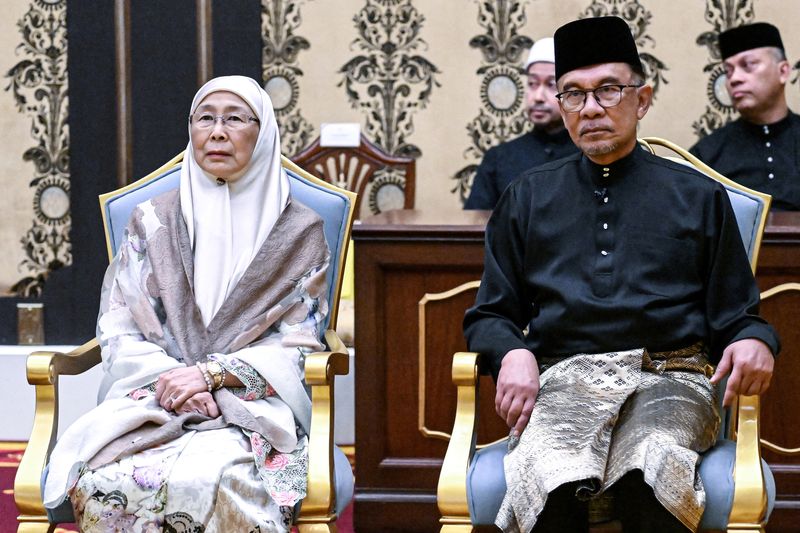(Reuters) - Malaysia's new prime minister, 75-year-old Anwar Ibrahim, was sworn in on Thursday, bringing to a close his three-decade quest for the job that had eluded him time and again and led to him spending nearly a decade in jail.
HOW DID HE RISE TO THE TOP?
As opposition leader, Anwar led tens of thousands of Malaysians in street protests in the 1990s against his mentor-turned-foe Mahathir Mohamad.
Anwar started off as a firebrand Islamic youth leader before joining then prime minister Mahathir's United Malays National Organisation (UMNO), which leads the Barisan Nasional alliance.
His strained relationship with the veteran leader shaped Anwar's own career, as well as Malaysia's political landscape, for nearly three decades.
Anwar's appointment as prime minister brings an end to a political crisis after an election on Saturday ushered in an unprecedented hung parliament. While Anwar's progressive bloc won the most seats in parliament, it fell short of a majority.
WHY WAS HE IN JAIL?
Between stints as deputy prime minister in the 1990s and as official prime minister-in-waiting in 2018, Anwar spent nearly a decade in jail for sodomy and corruption on charges he says were politically motivated.
Mahathir had called Anwar his friend and protege, and anointed him his successor, but later, amid criminal charges and disagreements over how to handle the Asian financial crisis in 1998, he said Anwar was unfit to lead "because of his character".
The two buried the hatchet briefly in 2018 to oust from power the political alliance they once belonged to - only to fall out again within two years, ending their 22-month-old government and plunging Malaysia into a period of instability.
WHAT IS HIS MANIFESTO?
Anwar told Reuters in an interview before the election that he would seek "to emphasize governance and anti-corruption, and rid this country of racism and religious bigotry".
For decades, Anwar has called for inclusiveness and an overhaul of the political system in the multi-ethnic country.
About 70% of the population of nearly 33 million comprises ethnic Malays, who are mainly Muslim, and indigenous groups with ethnic Chinese and Indians account for the rest.
Anwar called for the removal of policies favouring Malays and an end to a patronage system that had kept Malaysia's longest ruling coalition, the Barisan Nasional, in power.
His rallying cry of 'reformasi', or reforms, resonated nationwide, and is still the main promise of his alliance. HOW HAVE MALAYSIANS REACTED?
Anwar's supporters expressed hope that their charismatic leader's government would head off a return to historic tension between the ethnic Malay, Muslim majority and ethnic Chinese and Indian minorities.
"All we want is moderation for Malaysia and Anwar represents that," said a communications manager in Kuala Lumpur, who asked to be identified by her surname Tang.
"We can't have a country that is divided by race and religion as that will set us back another 10 years."

Authorities warned after the weekend vote of a rise in ethnic tension on social media and short video platform TikTok said it was on high alert for content that violated its guidelines.
"Always regarded as the man who could unite all warring factions, it is fitting that Anwar emerged during a divisive time," said political analyst James Chai, a visiting fellow at the ISEAS-Yusof Ishak Institute in neighbouring Singapore.